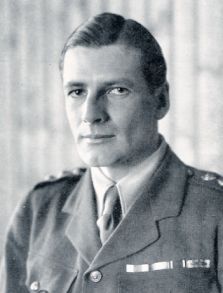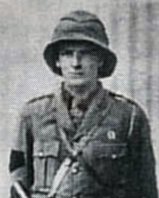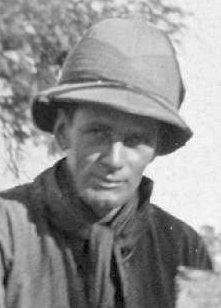Back to search results
Name: VON OTTER, Carl Erik August MC (Capt. Baron)



Birth Date: 9 Oct 1889 Stockholm, Sweden
Death Date: 7 Aug 1923 Lodwar
First Date: 1913
Profession: Soldier, admin. of Turkana district
Area: Northern Fronitier District; Nairobi; 1925 Lodwar
Married: In Boras 20 May 1911 Helga Maria Stenborg b. 7 May 1892 Boras, d. 23 Nov 1972 (she later m. in 1918 Carl Erik Lallerstadt 1889-1965 and in Copenhagen 1926 Carl Gustaf Von Otter 1881-1963)
Children: Margit Marie-Louise Augusta (Broms) (6 July 1912 Granna, Sweden-31 May 2008 Helsingborg); Birgitta Maria Katarina (Ghazala) (19 Nov 1913 Granna-8 Nov 2012 Stockholm)
Author: An Officer and Game Hunter in East Africa
Book Reference: Lytton, Moyse, Bror, KAD, Red 25, Hut, EAMR, Red 22, All Saints, Aschan
War Service: WW1 with EAMR - MGS - 7/8/14 - Cpl. 7/8/14; To 3 KAR
General Information:
Lytton - Herbert Dowling writes of Eric von Otter - "Rather striking in appearance. Tall - 6 ft. 1 in. I should say. Spare and lean. Not a surplus ounce of flesh. Tough as whipcord. Through constant exposure to the sun his face had rather a strange, blotchy appearance. To use his own expression 'the pigment had been burnt out'. Thus, in Turkana, part of his face was a deep brown (or rather red) with large patches of almost white. This also showed in his moustache, which was a handsome brown one with one distinctive patch of white. This was quite an arresting feature and the women were fascinated by it, but from the little I saw of him in Nairobi, he did not have much to do with the opposite sex.
He was, in a way, rather a difficult man to know. Rather inclined to retire into his shell. This was largely due, I believe, to the fact that before he had fully mastered the English language he used to get his leg pulled for minor mistakes in pronunciation. For example, he pronounced certain words in a way that gave them a coarse double-entendre, bearing in mind the rough-and-ready types in a war-time mess; there were apt to be hoots of merriment and the joke was tediously prolonged. When I joined, I noticed that, when the conversation reached a certain level, von Otter retired into his shell and ceased to be amused by our English sense of humour. ..... on bad terms with his wife and loved the deserts of Turkana. ....... excellent linguist, wrote a grammar on Turkana ...... great understanding of the African and his askaris worshipped him ...... Finest shot I've ever seen with rifle or shotgun ...... No believer in comfort on safari. .... I can only say he was a very fine man, for whom I had the greatest admiration and respect - difficult to say just why on paper - but you FELT his presence, and felt you were in the presence of a 'leader' who knew his job well and intended to carry it out conscientiously, and that he had no axe to grind. ........... von Otter's diary - "There are no nicer nor more interesting people than our askaris, when one goes on safari with them in the way I do. When I am on safari I live not only amongst them, I live with them, which according to my experience is the only method of getting to know the men and vice versa ....." Verdict of Col. T.O. Fitzgerald, doyen of KAR (in 1955) ..... "I knew him well as he served with me in my battalion, the 3rd KAR during the First Great War, and a most excellent officer he was ...... He was one of the most intrepid officers I have ever met; at times his fearless exploits almost amounted to foolishness. In one engagement, when we were in the Zunganetto bridge fight on the 15th June 1916, I had the opportunity of seeing his prowess, an act of bravery which, in the old days, would have won him the VC. I managed to get him an MC for this action, though his behaviour was worthy of a much higher award. ....Von Otter was a very hardy sort of chap, and would never take much care of himself. For instance, when he went away from headquarters on safari, by himself, he would take only a few pounds of rice and live on 'the smell of an oil rag'. I used to lecture him on the sparsement of his commissariat, and told him he was asking for trouble if he did not feed himself well, and indeed I am sure it was, to a very great extent, that lack of nourishing food which finished him off in the end. ..... He was a wonderful shot, not only with the rifle, but with the revolver as well. Poor Von Otter! A nice chap, but a difficult man to know. I could never get much out of him as regards his past, but I fancy there was some domestic trouble behind his veneer. Some love affair, perhaps, which made him almost reckless when under fire, not caring whether he got hit or not. ...... Col. Ted Brick says - von Otter was suffering from Addison's disease. According to Dr. Sargent, who attended and buried him, he died of blackwater, but in the 7th and last year of the span of life which Addison's disease is supposed to allow you. When Sargent told him there wasn't much hope for him, he made Sargent promise to burn all his books; he had an exceptionally good library, especially of books on Africa. All his clothes had to be burned too; he gave some guns and cameras to Sargent and to Ted his miniature medals. Sargent afterwards sold the guns and cameras and somehow, probably just coincidence, a legend grew that anyone holding anything of von Otter's was doomed; of those known to have been in possession of something of his, one was killed by an elephant, another committed suicide, a third got blackwater, and so on ..... Ted, like evryone else who knew von Otter, greatly admired his wonderful marksmanship; they used to throw soda sparklet bulbs in the air and never did von Otter miss. Von Otter was sent up to Turkana to take over from Bill Holland, who later was sent to be Consul at Mega where he too died, presumably from blackwater.
Bror - 1914 - The day before the declaration of war a few Swedes were assembled in my house - Erik von Otter, Helge Fõgerskjold, and Emil Holberg, all now dead. Next day Erik von Otter and I bicycled into Nairobi and reported ourselves at the recruiting office which was already open. Von Otter went into the KAR and I myself joined a corps which had been formed by an old SA friend of mine named Bowker and bore his name Bowker's Horse.
Aschan - "……. The Blixens entertained the Swedish Baron Erik von Otter on the farm at Ngong. In spite of his "foreignness" von Otter was still attached to the KAR. Tall, and good-looking, he had gained a remarkable reputation in the army, especially among his African askaris, whose company he preferred. He was an excellent shot and had acquired the name 'risasi moja' (one shot). He and Tanne became close friends through their common interest in the Koran and Islamic culture. Unlike Christians, Muslims have no concept of sin; Tanne felt this was altogether a more pragmatic and realistic view. With this concept in mind, she and von Otter went on safari together.
Considine - Carl Erik August von Otter
Gazette - 12/9/1923 - Probate and Administration - Capt. Baron Charles Eric von Otter, late of Lodwar Post, Turkana who died at Lodwar Post on 7 August 1923
Moyse - 1918 - new O.C. troops, Turkana at Lorogumo.
KAD 1922 - Capt. Coy. Comdr. 3rd KAR, Turkana
Gazette 12 Sep 1923 probate for Charles Eric Von Otter d. Lodwar Post 7 Aug 1923
Back to search results



